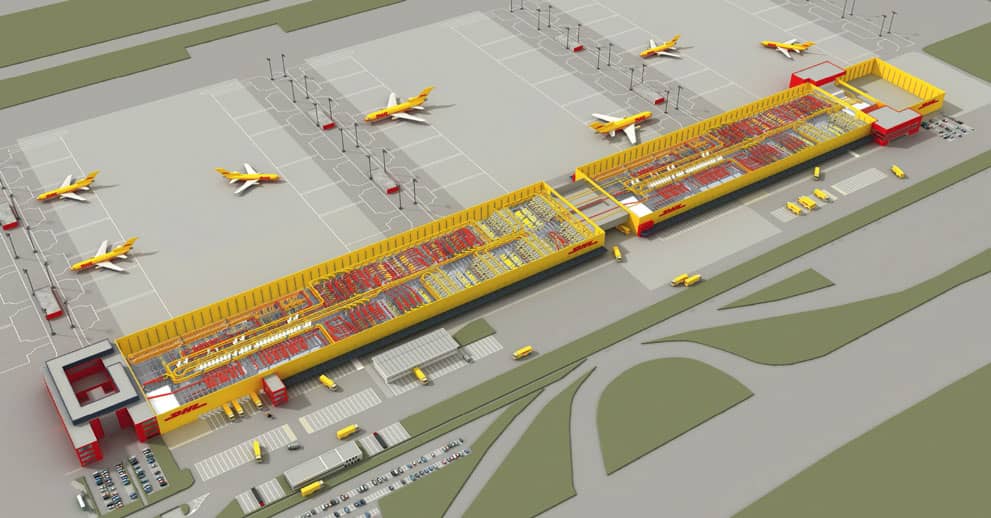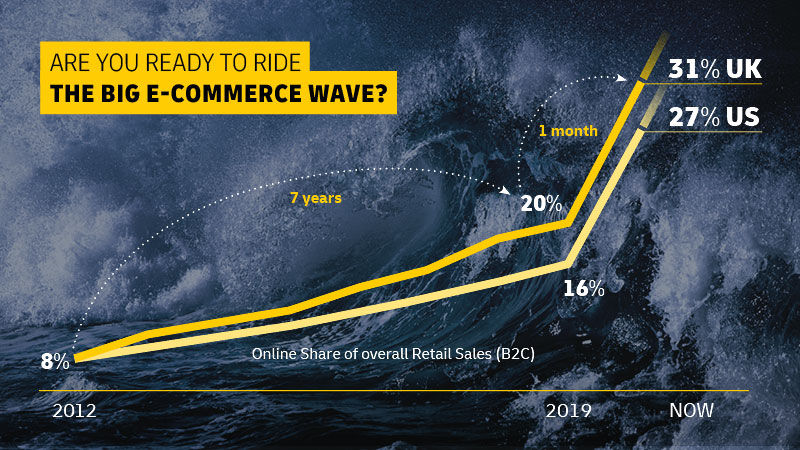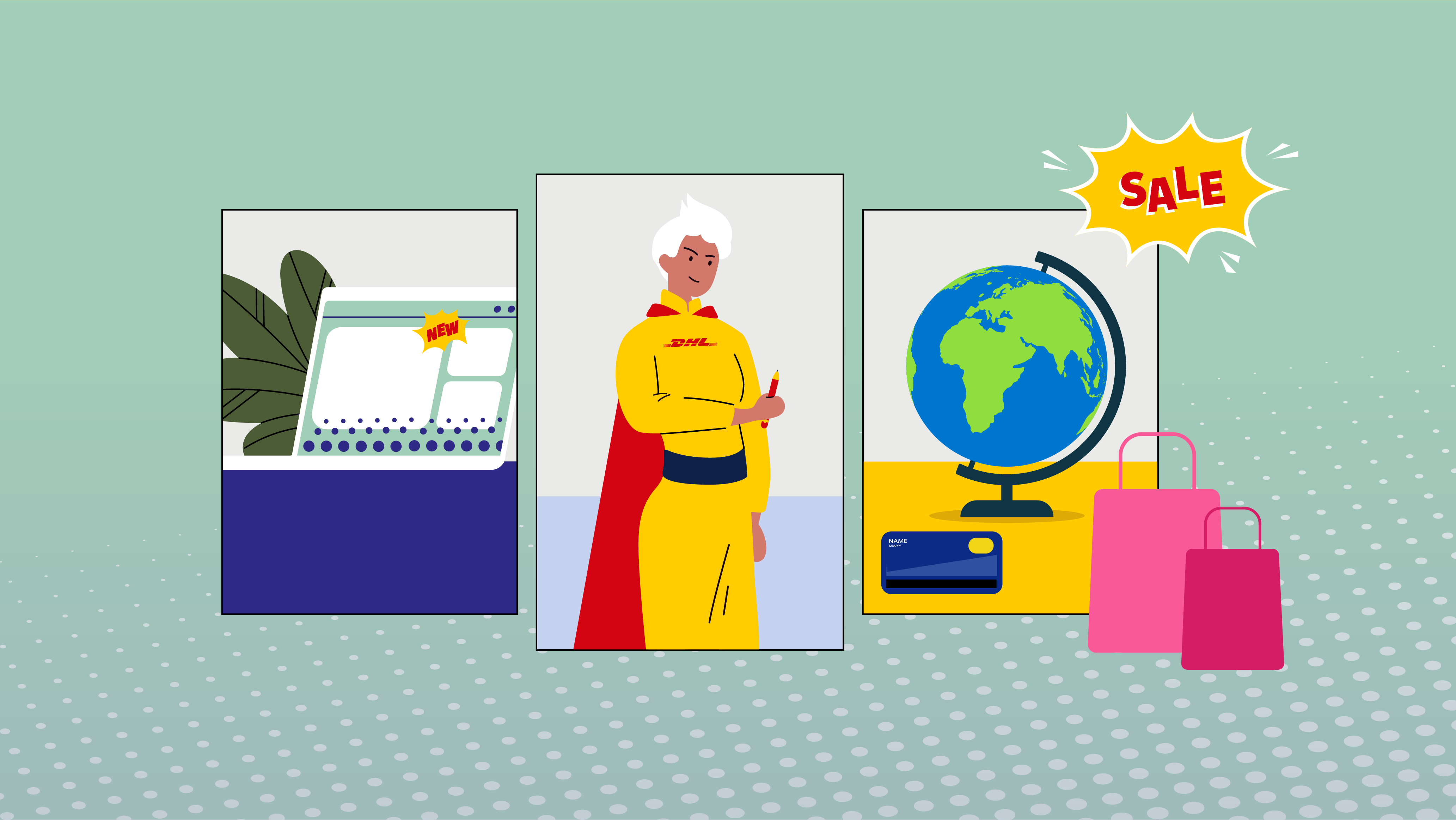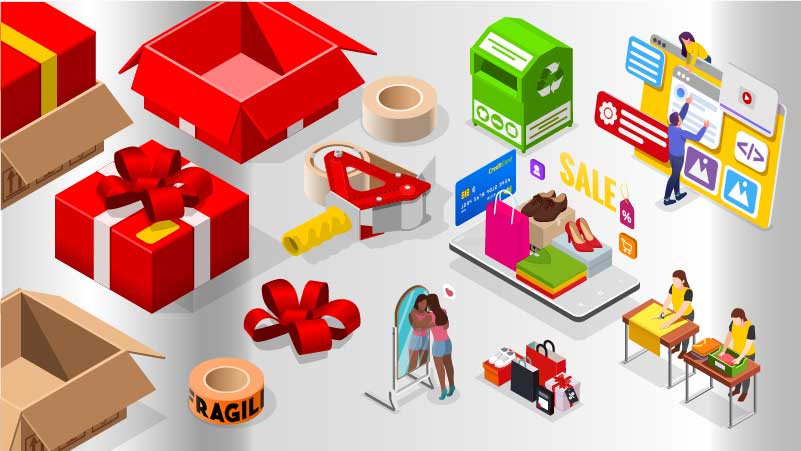This year’s peak season is forecast to be like no other, coming at the end of a transformative year for e-commerce in which the pandemic pushed online sales to record levels. With DHL Express expecting a paradigm shift in global trade, what does this mean for your e-commerce business, and how should you prepare your supply chain?
Over the last decade, e-commerce has enjoyed steady growth across the world. The rise of globalization and digitalization has created the perfect environment for e-commerce websites to thrive. A society of consumers who live with their phones in their hands has driven mobile commerce forward at rapid speed, allowing them to order almost anything, from anywhere in the world, at any time.
On the sellers’ side, it has never been easier to find and reach global shoppers. A range of online marketplaces and dedicated e-commerce apps help merchants fulfil orders to cross-border customers easily.

"Over the years, we have seen consumers and even businesses shift their purchases online, but the pandemic has truly pushed the trend to leapfrog a few years ahead.“
Ken Lee, CEO, DHL APAC
At a time when e-commerce was already enjoying considerable growth, along came 2020. The arrival of the pandemic acted as a catalyst for e-commerce, and almost overnight, sales reached unprecedented levels. With physical store closures looming, businesses rushed to get their products online and the D2C (direct to consumer) sector flourished.
“Covid-19 and its impacts such as curfews or distancing led to massive changes in the retail sector all over the world”, says Michiel Greeven, EVP Global Sales at DHL Express. “As a consequence, the buying behavior of consumers, but also B2B buyers, changed significantly and shifted more and more into the online world.”
Even the most reluctant of consumers were nudged online out of necessity, in particular, the older generation – the so-called ‘silver surfers’ – who took up online shopping for the first time during the pandemic. Having experienced the ease and convenience of it, especially with more websites providing different payment methods and international shipping, these new shoppers are likely to stay.
60% of consumers said they will continue to buy as much online as they do now even after the pandemic has passed. - Kantar1
“From an e-commerce perspective, some might even say that Covid-19 brought 2030 to 2020, with online shopping and the necessary shipping as the new normal”, Greeven continues. “And this not only applies to B2C retailers but also in the light of B2B e-commerce. In this current period of uncertainty, many giant stores will be going online with their sales promotions. This will have an effect on peak season as well, as shoppers will be going online to get the best deals instead of going to physical stores.”
But this growth in consumer demand has brought significant challenges to the supply chain.
The pandemic put pressure on global supply chains like never before, and although supply chains have already become highly sophisticated and increasingly important to the competitiveness of businesses, their global nature makes them vulnerable to risks, with little margin for absorbing delays and disruptions.
During the early weeks of the pandemic, global border closures and grounded flights meant e-commerce businesses that had considered their supply chains to be resilient quickly discovered that they weren’t.
In response, DHL Express hired more than 10,000 new employees globally. Thanks to its annual investments in infrastructure such as hubs and gateways, aircraft, vehicles and state-of-the-art technology, the company was able to multiply the capacities of its operations significantly and manage the increased shipment volumes.
The holidays are coming…
Against this backdrop of already-booming online spending in 2020, the e-retail industry is now gearing up for the busy holiday season. Digital Commerce 3602 forecasts that the COVID-19 pandemic will lead to an additional US$40 billion in online holiday revenue over November and December. Before the pandemic, this level wasn’t expected to be reached for another four years.
As DHL Express operates around the world, the company is always able to pursue these developments in other regions and countries of the globe. The company’s shipping volume numbers indicate an increase in online sales of at least 35%. And it forecasts that the upcoming peak season will further accelerate this, resulting in higher shipment quantities above 50% compared to last year's peak season.
The start of the peak holiday season is typically marked by China’s Singles’ Day on 11 November, followed by Black Friday and Cyber Monday at the end of the month, and then a final frenzy of online shopping in the few weeks before Christmas Day.
The results of Singles’ Day 2020 already confirm DHL’s peak season forecasts, with the country’s two biggest e-commerce platforms achieving record sales over the period. Between November 1 to 11, Alibaba Group3 hit US$75 billion in sales, a 26% year-on-year increase over 2019, whilst JD.com4 achieved over US$41 billion, a 32% increase5.
As the rest of the world moves into the busy holiday season, e-commerce businesses should use these Singles’ Day results as an indication of what’s to come. Facing such increasing volumes, and in parallel to Covid-19’s continued spread around the globe, the pressures on supply chains are massive, so this should be your main focus of attention to ensure good customer experience and fast shipping. In addition to the consistent observation of the situation and flexible management of precaution measures to keep employees safe, the unprecedented peak of shipments poses an additional challenge.
COVID-19 has already illustrated to many e-commerce businesses – particularly those who ship internationally – where investment in supply chain resilience and innovation is needed. And for that, DHL Express can help.
"Since many years we have seen a high demand from online merchants for our express services and therefore strong growing volumes in our global Express network", says Travis Cobb, EVP Global Network Operations and Aviation at DHL Express. "We annually invest approximately one billion Euros to meet our customers' requirements and ship their goods with the fastest possible transit times – all around the world. Our network is prepared for the upcoming peak. Even in times of a second wave of the global pandemic we will ensure that our customers’ businesses continue, and that global trade is secure."
DHL Express is prepared…are you?
Right now, the e-commerce industry is in an intense period of transformation and record sales, presenting businesses with lucrative sales opportunities as they move into the busy holiday season. Amongst this landscape, the priority is still your customers; specifically, ensuring the increased demand does not delay or slow down your deliveries. And that’s where DHL Express can help.

"We make sure that goods are delivered as fast as possible – and Christmas gifts are being delivered to households all over the globe in time.” John Pearson, CEO, DHL Express
John Pearson, CEO, DHL Express
Partnering with DHL Express this holiday season means you can offer your customers international and express shipping as standard at checkout. Beyond logistics, there are, of course, plenty of other considerations to prepare your business for the busy holiday season. From forecasting your stock needs, to ensuring delivery times are not affected by the increased demand, DHL’s Christmas checklist has all the tips to help you prepare for a good end to a very strange year.
From everyone at DHL, we wish you a happy holiday sales period, and an even more prosperous 2021.
1 - Kantar research, Global e, 2020
2 - Digital Commerce 360 forecast, ROI Revolution, November 2020
3 - Alibaba Group
4 - JD.com
5 - Singles’ Day sales figures, CGTN, November 2020






